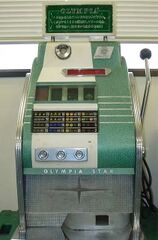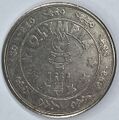Difference between revisions of "Olympia Star"
From Sega Retro
m (+flyer) |
m |
||
| Line 1: | Line 1: | ||
{{Bob | {{Bob | ||
| image=OlympiaStar SlotMachine.jpg | | image=OlympiaStar SlotMachine.jpg | ||
| − | | publisher=Olympia | + | | publisher=[[Olympia]] |
| developer=[[Sega]], [[Taito]] | | developer=[[Sega]], [[Taito]] | ||
| system=Slot machine | | system=Slot machine | ||
| Line 14: | Line 14: | ||
The exact history of the ''Olympia Star'' is not fully understood, although it is thought to have been named as such to cash in on the [[wikipedia:1964 Summer Olympics|1964 Summer Olympics]] (without any license to do so by the [[wikipedia:International Olympic Committee|International Olympic Committee]]). ''Olympia Star''s were also designed to use tokens which could be exchanged for money - a precursor to the "medal" system popularised by rival firm Sigma some years later (although some were illegally modified to accept real money). They were likely only ever sold in Japan. | The exact history of the ''Olympia Star'' is not fully understood, although it is thought to have been named as such to cash in on the [[wikipedia:1964 Summer Olympics|1964 Summer Olympics]] (without any license to do so by the [[wikipedia:International Olympic Committee|International Olympic Committee]]). ''Olympia Star''s were also designed to use tokens which could be exchanged for money - a precursor to the "medal" system popularised by rival firm Sigma some years later (although some were illegally modified to accept real money). They were likely only ever sold in Japan. | ||
| − | [[Taito]] also claims responsibility for the invention, suggesting that Sega copied their idea. In a later agreement, Taito and Sega are thought to have co-founded a company (Olympia Co., Ltd, unrelated to the later pachislot manufacturer) specifically to market these machines (and their successors), with Sega manufacturing the products and both companies sharing the profit from sales. | + | [[Taito]] also claims responsibility for the invention, suggesting that Sega copied their idea. In a later agreement, Taito and Sega are thought to have co-founded a company ([[Olympia|Olympia Co., Ltd.]], unrelated to the later pachislot manufacturer) specifically to market these machines (and their successors), with Sega manufacturing the products and both companies sharing the profit from sales. |
The ''Olympia Star'' would be followed by the ''[[New Olympia]]'' later in the decade. | The ''Olympia Star'' would be followed by the ''[[New Olympia]]'' later in the decade. | ||
Revision as of 05:55, 29 August 2023

| |||||||||
| Olympia Star | |||||||||
|---|---|---|---|---|---|---|---|---|---|
| System(s): Slot machine | |||||||||
| Publisher: Olympia | |||||||||
| Developer: Sega, Taito | |||||||||
|
This teeny-tiny article needs some work. You can help us by expanding it.
Olympia Star (オリンピア・スター) is a slot machine released in Japan around 1964 which reuses the shell of the Star series.
In the early 1960s, most forms of gambling were outlawed in Japan, and while various iterations of Sega produced slot machines, these are thought to have been for export around the pacific region, often in US-occupied territories were gambling laws were more relaxed. The Olympia Star is thought to have been produced to circumvent these limitations - while similar in design to Sega's other Star slot machines, it has three action buttons at the front of the unit, giving players control over when the reels would stop. The argument was therefore made that the Olympia Star was a game of skill rather than a game of chance, and so did not qualify as gambling.
The exact history of the Olympia Star is not fully understood, although it is thought to have been named as such to cash in on the 1964 Summer Olympics (without any license to do so by the International Olympic Committee). Olympia Stars were also designed to use tokens which could be exchanged for money - a precursor to the "medal" system popularised by rival firm Sigma some years later (although some were illegally modified to accept real money). They were likely only ever sold in Japan.
Taito also claims responsibility for the invention, suggesting that Sega copied their idea. In a later agreement, Taito and Sega are thought to have co-founded a company (Olympia Co., Ltd., unrelated to the later pachislot manufacturer) specifically to market these machines (and their successors), with Sega manufacturing the products and both companies sharing the profit from sales.
The Olympia Star would be followed by the New Olympia later in the decade.
Promotional material
Photo gallery
References
- ↑ http://thetastates.com/eremeka/1969prior.html (Wayback Machine: 2023-08-21 09:33)

